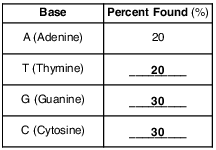Topic: Genes And Proteins Systhesis
Genes And Proteins Systhesis
In a DNA sample, 15% of the bases are thymine (T). What percentage of the bases in this sample are adenine (A)?
(1) 15%
(2) 30%
(3) 35%
(4) 85%
The instructions for the genetic traits of an organism are directly determined by the
(1) numbers of A, T, C, and G units in a sugar molecule
(2) sequence of bases in DNA molecules
(3) length of a DNA molecule
(4) way the bases are paired in the two strands of a DNA molecule
Sexually reproducing organisms pass on genetic information as a
(1) long chain of amino acids
(2) complex series of inorganic proteins
(3) sequence of complex sugars
(4) sequence of the bases A, T, C, and G
In a DNA molecule, if 38% of the molecular bases are C (cytosine), what percent of the bases are T (thymine)?
(1) 12
(2) 24
(3) 38
(4) 62
The Galapagos pink land iguana, Conolophus marthae (C. marthae), is native to only one of the Galapagos Islands. Its entire range is currently limited to Wolf Volcano on Isabella Island. The iguana was first discovered on this island in 1986. Genetic studies of the animal began sometime later, and it was identified as a species separate from other iguana populations on the Galapagos in 2009. Its population might have been as high as 100 in 1986, but now there might be as few as 10 of the animals left alive.
Other evidence indicates that this species could have diverged from another line of iguanas about 5.7 million years ago. After that, the other line of iguanas diverged into two other species, C. pallidus and C. subcristatus.
The testing that revealed that these iguanas are a separate species from the other iguanas present in the Galapagos most likely included
(1) genetic engineering
(2) cloning studies
(3) DNA analysis
(4) the use of paper chromatography
The molecule DNA contains the four bases listed below.
A – adenine C – cytosine G – guanine T – thymine
Which base pairings normally occur during DNA replication?
(1) Guanine pairs with cytosine. Thymine pairs with thymine.
(2) Adenine pairs with thymine. Cytosine pairs with guanine.
(3) Thymine pairs with guanine. Cytosine pairs with adenine.
(4) Cytosine pairs with cytosine. Thymine pairs with thymine.
A student used a microscope like the one represented below to observe cell division in onion cells.

The student noticed that as the new cells formed, they contained rod-shaped chromosomes. It is necessary for onion cells to contain chromosomes because chromosomes
(1) are composed of genes that contain the instructions for an organism’s traits
(2) are made of carbohydrates and are needed as an energy source
(3) direct the production of inorganic molecules within the cell
(4) are composed of lipids that contain stored nutrients for the new cell
A scientist analyzed a segment of DNA from a human chromosome and found that the percentage of thymine molecular bases (T) was 35%. Which row in the chart below contains the correct percentages of the other molecular bases in the DNA segment?

(1) 1
(2) 2
(3) 3
(4) 4
The DNA of a fly and the DNA of a gorilla are made up of subunits that are
(1) arranged in the same order in both species
(2) arranged in chains of the same length in both species
(3) different bases in each of the two species
(4) in different sequences in each of the two species
Which statement is an accurate description of genes?
(1) Proteins are made of genes and code for DNA.
(2) Genes are made of proteins that code for ni- trogen bases.
(3) DNA is made of carbohydrates that code for genes.
(4) Genes are made of DNA and code for pro- teins.
A sample of DNA from a human skin cell contains 32% cytosine (C) bases. Approximately what percentage of the bases in this sample will be thymine (T)?
(1) 18
(2) 24
(3) 32
(4) 36
Researchers use a variety of techniques to learn more about the function of a specific gene in an organism. In one type of experiment, called a loss-of-function experiment, the gene being investigated is eliminated. In a gain-of-function experiment, extra copies of the gene being investigated are inserted. The cell process most directly affected in both experiments is
(1) protein synthesis
(2) waste disposal
(3) transport of materials
(4) breakdown of nutrients
AAC–GCC–GTC–CGC–TAG
Identify the mRNA codons that would be produced using this DNA as a template. [1]
DNA base sequence: AAC GCC GTC CGC TAG
mRNA codons: _____ _____ _____ _____ _____
Allow 1 credit for completing the chart as shown below.
• DNA base sequence: AAC
• GCC
• GTC
• CGC
• TAG
• UUG CGG CAG GCG AUC mRNA codons: _____
• _____
• _____
• _____
• _____
DNA samples were taken from three different species and used to determine the amino acid sequence for a portion of a particular protein. The amino acids were then compared in order to determine which species were most closely related. Some of the information is shown on the table below.
TGA ACU
TGA ACU THR AGA UCU SER

State one specific effect on the protein produced if an mRNA code is changed from AGU to AGA. [1]
Allow 1 credit. Acceptable responses include, but are not limited to:
• — The amino acid ARG will be substituted for SER.
• — The shape of the protein might change.
• — The protein might not work.
A double-stranded DNA sample was analyzed to establish the percentage of different molecular bases present. The data table below shows the percentage of adenine bases found. Calculate the percentage of each of the three remaining molecular bases, and write the percentages of each in the chart. [1]

Allow 1 credit for correctly filling in the missing results.
• 
